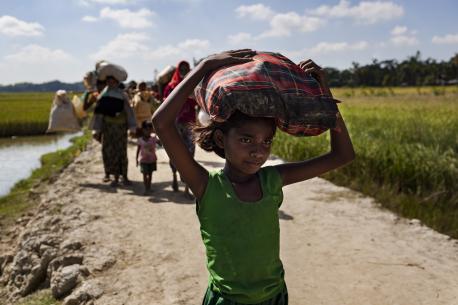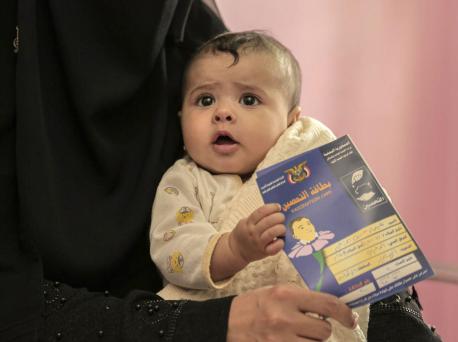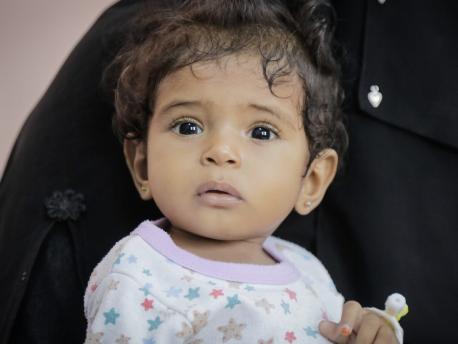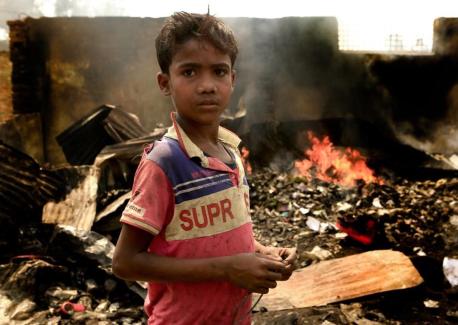
How to Help Rohingya Refugees
There are 500,000 Rohingya refugee children growing up in refugee camps in Bangladesh, their families entirely dependent on humanitarian aid. Learn what UNICEF is doing to provide support and protect their rights.
Rohingya refugee crisis: flight from Myanmar to Bangladesh
The Rohingya are a Muslim minority community that has lived for centuries in Myanmar, where they have long suffered persecution. In August 2017, having become the targets of a military-led campaign of brutal violence, over 700,000 Rohingya fled Myanmar’s Rakhine state into Bangladesh, joining hundreds of thousands more who had fled Myanmar during a previous exodus.
The refugees, whose numbers have since swelled to nearly 1 million, have mainly settled in Cox’s Bazar, where hillsides were quickly cleared of trees and vegetation to accommodate the massive influx of traumatized families and children.
The deforestation made room for the rows and rows of temporary bamboo shelters where the Rohingya now live. But it also created conditions that are ripe for disaster, especially during monsoon season.
Torrential downpours and strong winds often cause flooding and landslides, damaging homes and other critical infrastructure, including health and learning centers — disrupting essential services and once again putting children's education on hold.
When water systems, latrines and other sanitation facilities are compromised, the risk of cholera, malaria, dengue and other waterborne disease increases.
In the off season, fires are a constant danger.
How UNICEF is helping Rohingya refugees
Since the beginning of the crisis, UNICEF has been working with the Bangladesh government and other partners to deliver relief to children and families living in the refugee camps while also providing humanitarian assistance to those in need in host communities.
A top priority is to address rising malnutrition among Rohingya refugee children, including a sharp increase in the number of children suffering from wasting, a lethal condition when untreated. UNICEF supports screenings and treatment with Ready-to-Use Therapeutic Food (RUTF).
Another focus is child protection. With minimal livelihood opportunities and limited hope, children and families are under constant threat, often resorting to negative coping mechanisms including child marriage and child labor. Many children are subjected to violence, abuse and exploitation.
UNICEF supports youth centers and clubs in the camps that provide a range of activities that help keep kids safe while also helping them to build life skills. UNICEF also reaches tens of thousands of women, girls and boys with gender-based violence (GBV) risk mitigation, prevention and/or response interventions.
To ensure children's access to education, UNICEF supports 4,200 learning facilities, some of them community based. Over 300,000 children in the camps are able to access expanded education opportunities as a result. Of these, at least 250,000 are following the Myanmar Curriculum to help facilitate their future return — though when that may be remains uncertain.
Through other programs and partnerships, UNICEF is also:
building and maintaining water systems to ensure sufficient access to safe water
providing mental health and psychosocial support services to children, adolescents and caregivers
supporting maternal and newborn health care services
immunizing children to protect against vaccine-preventable diseases
distributing Vitamin A supplements to boost child nutrition
training volunteer teachers
Donation FAQ
DonateUNICEF works in over 190 countries and territories to save children’s lives and defend their rights. UNICEF has helped save more children’s lives than any other humanitarian organization.
However, UNICEF wants more for children than survival. Before, during and long after disaster strikes, UNICEF and partners provide programs designed to help every child fulfill their potential, from early childhood through adolescence.
Yes, all donations made to UNICEF USA are 100 percent tax-deductible. You will receive a receipt for tax purposes for your records. For reference UNICEF USA’s tax ID information is:
U.S. Fund for UNICEF d/b/a UNICEF USA
Our Federal Identification Number is 13-1760110.
The IRS letter confirming our 501(c)(3) status can be downloaded here in PDF format.
UNICEF employs rigorous monitoring and evaluation processes to assess the impact of its programs. Through data collection, assessments and engagement with the communities it serves, UNICEF ensures that interventions achieve the maximum outcomes for the most significant number of children.
You can always find more information on how to support UNICEF USA here: https://www.unicefusa.org/how-help/donate



